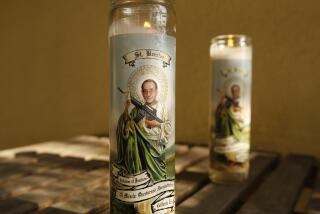Melvin Brunetti dies at 75; federal appeals court judge
- Share via
Melvin Brunetti, a federal appeals court judge for the last 24 years whose opinions included upholding anti-hate crime legislation, broader Pentagon scrutiny of homosexuals’ security clearances and the death penalty for Robert Alton Harris, has died. He was 75.
Brunetti died Friday at his home in Reno after a long battle with cancer, his family told the U.S. 9th Circuit Court of Appeals, to which he had been appointed by President Reagan in 1985.
He had been on senior status with the appeals court since 1999, a semi-retirement in which a judge is replaced on the active roster but continues to handle a reduced caseload.
Brunetti came to the federal bench through the unusual path of an electrical engineering degree from the University of Nevada and seven years in the dairy industry before obtaining a law degree in 1964 from UC Hastings College of Law in San Francisco.
Brunetti returned to Nevada after law school where he worked in private practice for 15 years before his appointment to the appeals court. He also served as Nevada State Bar president the year before his appointment.
Circuit Judge Diarmuid F. O’Scannlain, a fellow Reagan appointee, credited Brunetti’s business and accounting experience for his “knack in questioning counsel in a way that brought out fascinating aspects of a case.”
“He was just a delightful colleague,” said O’Scannlain, adding that Brunetti also had a good track record with the U.S. Supreme Court, which has a history of disproportionately overturning 9th Circuit decisions.
Brunetti’s most notable opinion was probably the 9th Circuit panel ruling in 1990 upholding the conviction and death sentence for Harris for the murder of two San Diego teenagers in 1978. Harris was put to death in the gas chamber in 1992, the first execution in the state after a 25-year hiatus during which the penalty’s constitutionality was reviewed and debated on the federal and state levels.
In 1996, however, Brunetti joined two other 9th Circuit judges in a historic ruling that the gas chamber “is inhumane and has no place in civilized society.” All 11 subsequent executions in the state have been done by lethal injection.
In a 1990 ruling deemed a “disaster for gays” by civil rights advocates, Brunetti wrote for a three-judge panel that homosexuals aren’t a protected class of individuals under the Constitution and that the Pentagon had “a rational basis” for subjecting them to greater scrutiny for secret and top-secret security clearances.
In 1997, Brunetti wrote an opinion that upheld a statute prohibiting racially motivated assaults, a case stemming from an attack on a Latino jogger in a public park in Cathedral City. In a case involving University City High School in San Diego, Brunetti wrote for the court that same year that a public school that makes classrooms available to secular student clubs during lunch hour must provide the same accommodation for a religious club.
Brunetti also was the chairman of the 9th Circuit’s Space and Security Committee for many years, securing new courthouses and facility upgrades made necessary by the continuous expansion of the appeals court and its caseload, his fellow judges said.
The judge, who was born Nov. 11, 1933, in Reno, is survived by his wife of 44 years, Gail; daughter Nancy and son Bradley; two brothers, Larry of Boise, Idaho, and Frank of Castro Valley, Calif.; two grandchildren and four great-grandchildren.
Funeral services will be Saturday in Reno and a private burial is planned, the court reported in announcing Brunetti’s death.
More to Read
Start your day right
Sign up for Essential California for the L.A. Times biggest news, features and recommendations in your inbox six days a week.
You may occasionally receive promotional content from the Los Angeles Times.







